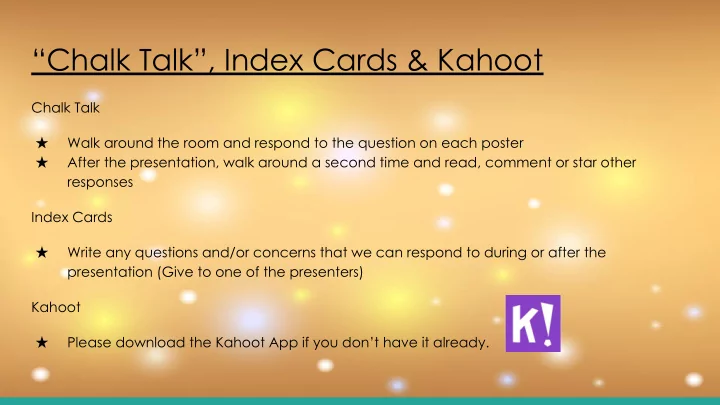

“Chalk Talk”, Index Cards & Kahoot Chalk Talk Walk around the room and respond to the question on each poster ★ After the presentation, walk around a second time and read, comment or star other ★ responses Index Cards Write any questions and/or concerns that we can respond to during or after the ★ presentation (Give to one of the presenters) Kahoot Please download the Kahoot App if you don’t have it already. ★
Kindergarten Readiness Pembroke Kindergarten Kick off May 2019
Welcome! Tonight’s Agenda Introductions-staff and PTA ★ Quick overview from Kindergarten Round up ★ 1st day/start time (½ days first week) ○ Drop off “schedule” ○ August meet and greet ○ Brief literacy/curriculum overview ★ What should you expect ○ What can you do to practice ○ SWAG BAG :) ○ Explanation and reminder to sign up for “screener” ★ Question & Answer ★ Mingle and Chalk talk Gallery Walk ★
Round-Up Reminders 1st day/start time (½ days first week - dismissal 12:05) ○ 8:35 drop off - school start time 8:44 ■ Dismissal 3:50 (½ days during the year dismissal 12:05) ■ Drop off “schedule” ○ Drop off at gym doors - see welcome pack for “first week details” (will ■ also go over during “Meet & Greet” in August) August Meet and Greet - TBD ○ Pembroke Carnival-June 7th, 6-8 ○ T-Shirts ○ Kids Club ○ Vickie Muir ■ 248-203-3880 VMuir@birmingham.k12.mi.us
Curriculum Overview Daily Five - Readers’ Workshop & Guided Reading Read to Self ★ Read to Someone ★ Listen to Reading ★ Work on Writing ★ Word Work ★
Curriculum Overview Con’t. Math Workshop ★ Writers’ Workshop ★ Science ★ Social Studies ★ Social Emotional Health ★ Unified Arts (P.E., Art, Music, Media) ★
Kahoot Please take a moment to download the free Kahoot! app on your phone to be used during our next activity. Enter this PIN: 223237 https://play.kahoot.it/#/?quizId=f07a5eca-55ee-41ee-ae35-995cca713d66
READ ALOUDS Whether at home, in the lap of a parent, or on a rug listening to a teacher, the joy of having someone read to you is not easily forgotten. Research has consistently shown that simply reading aloud to children helps them build valuable comprehension skills. Until students reach their late middle school years, listening comprehension skills exceed reading comprehension.
READ ALOUDS CON’T. 1. Pick a Book: Let the child choose the book from a selection of books ranging in genre and topics. Present a selection that will challenge their listening skills. 2. Before You Even Start Reading: Briefly introduce the book and set a purpose for the read aloud with the child before you start reading. Tailor the purpose to each individual book. 3. Make it Interactive: Ask questions, discuss the book with the child by asking comprehension questions during the read aloud. These questions encourage children to think carefully about texts and provide evidence for their thinking. In addition, discuss one or two vocabulary words and review over the next several weeks until the child knows it. 4. Bring it Full Circle: End with a question or prompt to bring the child back to the purpose set before reading. This allows students to consolidate their thinking and share what they have learned while reading. Whether a tutor, parent, teacher, family member, or friend, by reading aloud to a child you are making a positive impact on his/her reading skills, education, and life.
MORE ABOUT READ ALOUDS Listening comprehension is an important skill for children to develop in their early years of literacy training. Listening comprehension skills enable students to: 1. Enjoy books and develop a positive association with reading. 2. Develop and practice listening comprehension skills. 3. Enable students to understand more challenging and complex texts. 4. Practice critical thinking skills. 5. Build vocabulary and background knowledge.
Oral Language and Conversations By talking with your children and reading books aloud with ● them, you help them understand word meaning, sentence structure, and social language. This will help to prepare them to make sense of complicated ● stories by using their prior knowledge to puzzle out tough new words and confusing new phrases. Cunningham, A. & Zibulsky, J. (2014) Book Smart: How to Develop and Support a Successful Motivated Reader, Oxford University Press.
Conversations During Meals Provide opportunities for the family to bond, plan, connect, and ● learn from one another. It’s a chance to share information and news of the day, as well ● as give extra attention to your children Learn and practice important language skills ● Learn new vocabulary ●
Swag Bags What’s inside? ● Name tracing sheet/marker ● Abc chart ● Sidewalk chalk activities ● Book list-about kindergarten ● Fine motor skills ● Prompts to use when reading with child ● Letter formation ● Book about Pembroke ● Cut up name ● Pembroke pencil ● Pembroke magnet
Questions???
Recommend
More recommend